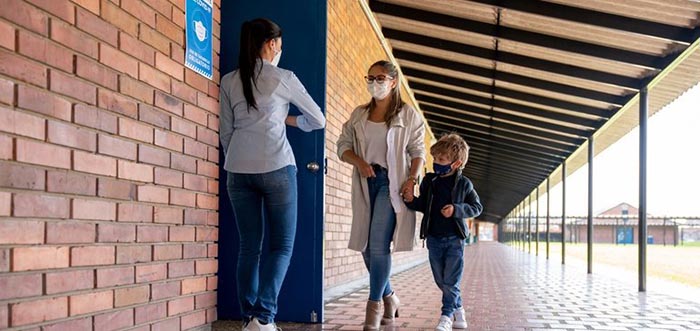
From K-12 Dive
By Anna Merod
Jan. 6, 2022
Dive Brief:
Some 68% of parents with school-aged children are worried about “politicians who are not educators making decisions about what students learn in the classroom,” according to a survey of 1,481 parents and guardians released in December by Learning Heroes, a nonprofit that provides information and tools to parents to help support their children’s educational and developmental success. This was parents’ top concern, followed by worries over their children’s happiness and emotional well-being, their children experiencing stress or anxiety, and someone in their family getting COVID-19.
Learning Heroes also polled 305 teachers and 304 principals, of which 87% said building trust among parents is a top priority. Additionally, of the principals surveyed, 84% said they plan to spend the same amount of time and effort or more on family engagement this school year as last. A majority of parents (93%) also said they plan to be as or more involved in their children’s education moving forward.
The research reflects a desire among both parents and educators for increased family involvement in schools, said Bibb Hubbard, president and founder of Learning Heroes. The key to addressing this need is to create ongoing, sustained and predictable communication between parents and teachers, Hubbard said.
Dive Insight:
The Learning Heroes survey findings reveal a need for family engagement among parents and educators even as teachers face growing distrust from the public fueled by controversial pandemic protocols and debates surrounding critical race theory.
State legislatures saw bills increasingly introduced toward the end of 2021 to limit discussions in K-12 schools about gender, race or other divisive topics, according to PEN America, a nonprofit advocating for free expression. Jonathan Friedman, director of free expression and education at PEN America, previously told K-12 Dive he expects this trend to continue into 2022.
The Learning Heroes research reveals parents want to be more involved in their children’s education alongside teachers, but they also want to see less political involvement in students’ learning, Hubbard said.
“Right now politicians are just kind of toxic at that macro-level, so I think that’s what triggered that response,” Hubbard said. “How do we build trust between our educators, our local officials and our families in a way that meets the needs of families and their children?”
If districts already had communication structures in place to build sustainable relationships between families and communities, it’s possible there would be fewer issues regarding mistrust and schools, she added.
To address concerns about political involvement in classrooms, National PTA President Anna King said in an email, parents could meet with school leaders to discuss topics of concern. They could also attend school board meetings, serve on school boards or work with school and state leaders to implement strong family engagement policies, King added.
And when it comes to schools, administrators can build relationships with families by approaching learning differences with sensitivity and empathy, she said.
“Put yourself in their shoes and consider the perspective of a parent or caregiver who is trying to support their child,” King said. “Remember that the goal of any communication should be to build real relationships with families — not just transactional conversations.”
It’s also helpful to find out how individual families prefer to communicate, whether that be in person or through emails, notes, phone calls or video conferences, she said.
Another way to build trust between families and educators is by encouraging teachers to do short home visits at the beginning of the school year, Hubbard said.
Hubbard added it’s important for teachers to have the support and training to hold consistent conversations with parents about their child’s progress. It’s equally as key for parents to share how students are doing at home as it is for teachers to share how they’re performing in the classroom, she said.
Often, communication between families and schools is through a report card, but that doesn’t always completely reflect how a child is performing in school, Hubbard said.
In fact, the Learning Heroes survey found 92% of parents believe their child is at or above grade level in math and reading, while only 44% of teachers believe most of their students are prepared for grade-level work.
Overall, Hubbard said she is hopeful for the future since the research shows educators and parents have shared goals regarding family engagement and student success. Now, it’s time to build off of that, she said.
Photo: Stock Photo via Getty Images
Read this and other stories at K-12 Dive

